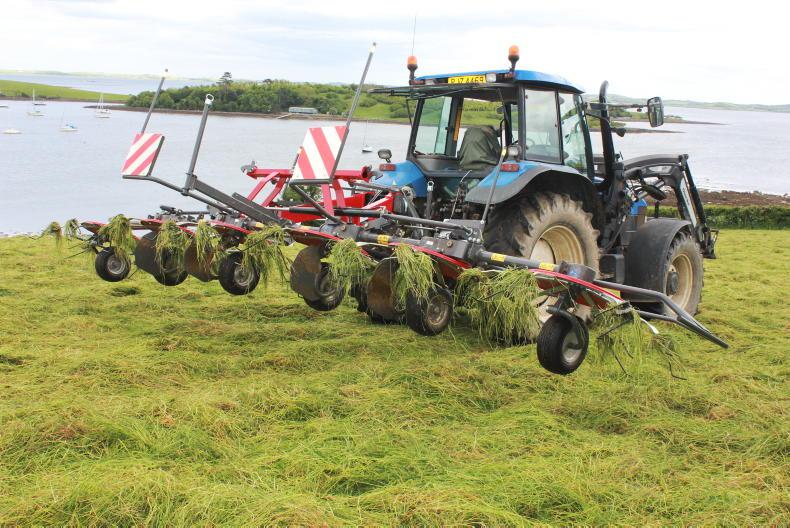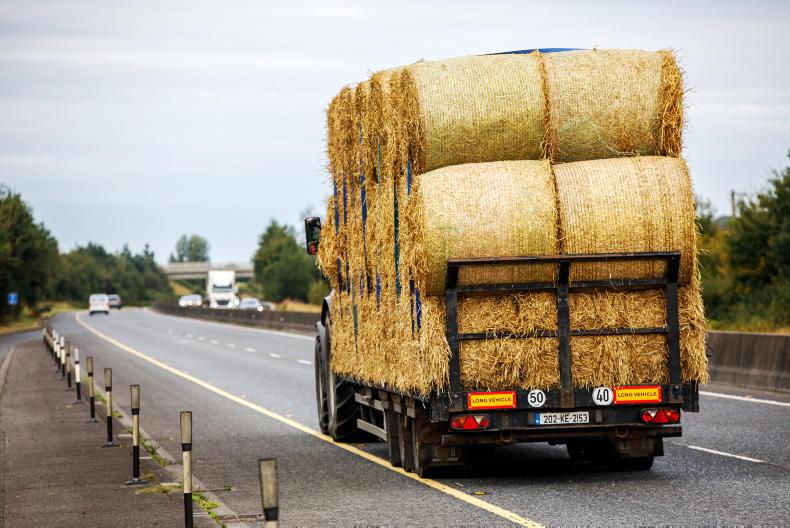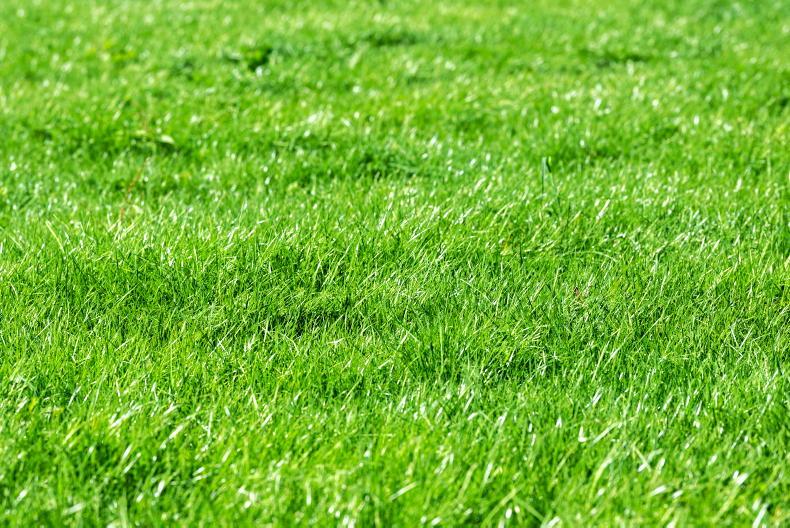After years of threatening to do it, I have finally put my money where my mouth is. I have bought myself a grass tedder and have (almost) no excuses left for not making exactly the type of winter fodder that is deemed important for this farm.
Firstly, to the ‘why’ aspect of this debatable exercise. I consider increased dry matter silage (in a bale-only farm system) highly desirable on several fronts.
It is easier to handle, both manually in and around lambing pens and mechanically with the bale unroller. It is also more pleasant to stack bales that retain their shape, instead of collapsing like pancakes when placed on top of one another.
From a financial aspect, there are fewer bales per acre to pay due to the reduced volume of grass, although you could equally argue that this may be counterproductive when the cost of several runs of the tedder is added.
Most importantly, I believe it greatly reduces the risk of poor fermentation due to wet grass being baled up during unsettled weather.
When you have only pregnant ewes or young growing cattle dining in your restaurant, you cannot serve up grub that isn’t tasty.
In addition, bales that are carried over to the following winter seem to suffer much less degradation than their juicier counterparts. And the same argument applies to any bales with small rips or ladders in the plastic – waste material is often confined to a small area around the hole.
Analysis
Perhaps a more contentious argument is my growing suspicion that a chemical analysis undervalues very dry (above 40% dry matter) silage. It tends to throw up a disproportionately low ME figure, whereas a lot of this potentially poor animal performance is balanced by higher dry matter intakes.
Certainly, the recent drought years have resulted in me making grass that analytically had an energy figure below 10 and yet when fed to in-lamb ewes, it appeared to do the same job as wetter samples with an ME greater than 11.
I cannot back any of this up with concrete proof or definite performance figures, so I’ll admit that the accusation of being a “notionate oul farmer” is entirely plausible.
Cost
On the money front, I am quite happy to hold my hands up and admit that, on paper, it is a wholly unjustifiable luxury item. There was a time in my farming career when I would have worked it all out beforehand. The calculation would have told me that the depreciation on a new machine would pay someone to ted my grass, and therefore it was a complete waste of finances.
But that is only half the story. I repeatedly tell anyone who cares to listen that the differences in disposable income between a younger farmer, possibly with youngsters to rear and parents to look after, and someone in my current situation, is huge. And therefore, having come through those more challenging financial times (when I couldn’t have afforded a third-hand one), I feel I can indulge myself a little with some shiny toys.
Perhaps with a grass tedder, it’s a case of making hay while the sun shines (pun intended). However, they don’t come cheap, and this six-rotor machine set me back £11,500 + vat.
Mental health
The final reason for buying what some would view as an unreasonable purchase is the unquantifiable benefit for mental health. During typically mixed NI weather, stress levels can be stratospheric if wet swards of mown grass can’t be instantly kicked out when the sun and wind finally appear.
So instead of making a grovelling phone call to one of my farming friends to see how long before they’ll come, I can now hop into the cab and go ted some grass. If the rain happens to return overnight, I can then re-do the whole area if necessary.
Presumably, there are farmers who can shrug their shoulders in these situations, then go and busy themselves doing something else, while the sun beams down on saturated swards that are begging to be teased out. Unfortunately, I’m just not one of them, so I admit that the price I am willing to pay for a more stress-free life is over £11k.
Read more
New cycle with the dairy heifers
Purebreds not behaving like proper sheep
After years of threatening to do it, I have finally put my money where my mouth is. I have bought myself a grass tedder and have (almost) no excuses left for not making exactly the type of winter fodder that is deemed important for this farm.
Firstly, to the ‘why’ aspect of this debatable exercise. I consider increased dry matter silage (in a bale-only farm system) highly desirable on several fronts.
It is easier to handle, both manually in and around lambing pens and mechanically with the bale unroller. It is also more pleasant to stack bales that retain their shape, instead of collapsing like pancakes when placed on top of one another.
From a financial aspect, there are fewer bales per acre to pay due to the reduced volume of grass, although you could equally argue that this may be counterproductive when the cost of several runs of the tedder is added.
Most importantly, I believe it greatly reduces the risk of poor fermentation due to wet grass being baled up during unsettled weather.
When you have only pregnant ewes or young growing cattle dining in your restaurant, you cannot serve up grub that isn’t tasty.
In addition, bales that are carried over to the following winter seem to suffer much less degradation than their juicier counterparts. And the same argument applies to any bales with small rips or ladders in the plastic – waste material is often confined to a small area around the hole.
Analysis
Perhaps a more contentious argument is my growing suspicion that a chemical analysis undervalues very dry (above 40% dry matter) silage. It tends to throw up a disproportionately low ME figure, whereas a lot of this potentially poor animal performance is balanced by higher dry matter intakes.
Certainly, the recent drought years have resulted in me making grass that analytically had an energy figure below 10 and yet when fed to in-lamb ewes, it appeared to do the same job as wetter samples with an ME greater than 11.
I cannot back any of this up with concrete proof or definite performance figures, so I’ll admit that the accusation of being a “notionate oul farmer” is entirely plausible.
Cost
On the money front, I am quite happy to hold my hands up and admit that, on paper, it is a wholly unjustifiable luxury item. There was a time in my farming career when I would have worked it all out beforehand. The calculation would have told me that the depreciation on a new machine would pay someone to ted my grass, and therefore it was a complete waste of finances.
But that is only half the story. I repeatedly tell anyone who cares to listen that the differences in disposable income between a younger farmer, possibly with youngsters to rear and parents to look after, and someone in my current situation, is huge. And therefore, having come through those more challenging financial times (when I couldn’t have afforded a third-hand one), I feel I can indulge myself a little with some shiny toys.
Perhaps with a grass tedder, it’s a case of making hay while the sun shines (pun intended). However, they don’t come cheap, and this six-rotor machine set me back £11,500 + vat.
Mental health
The final reason for buying what some would view as an unreasonable purchase is the unquantifiable benefit for mental health. During typically mixed NI weather, stress levels can be stratospheric if wet swards of mown grass can’t be instantly kicked out when the sun and wind finally appear.
So instead of making a grovelling phone call to one of my farming friends to see how long before they’ll come, I can now hop into the cab and go ted some grass. If the rain happens to return overnight, I can then re-do the whole area if necessary.
Presumably, there are farmers who can shrug their shoulders in these situations, then go and busy themselves doing something else, while the sun beams down on saturated swards that are begging to be teased out. Unfortunately, I’m just not one of them, so I admit that the price I am willing to pay for a more stress-free life is over £11k.
Read more
New cycle with the dairy heifers
Purebreds not behaving like proper sheep










SHARING OPTIONS